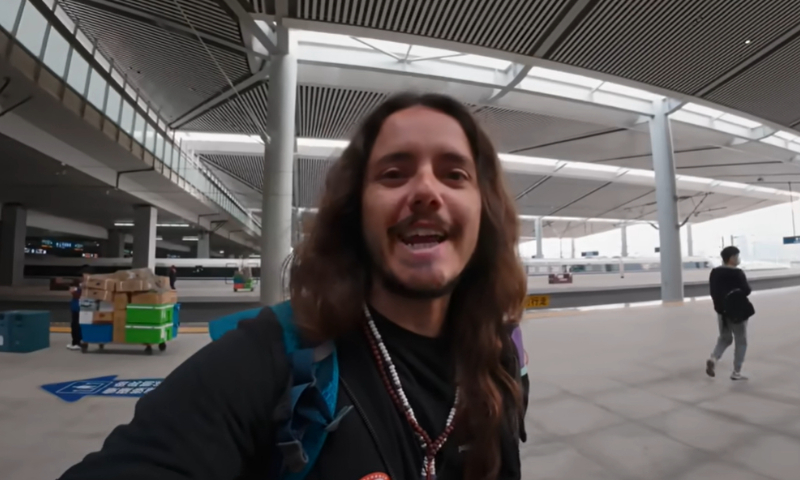Italian Nicolò Balini is a travel vlogger on YouTube with over 1 million subscribers. In June of this year, he embarked on his second trip to China, visiting cities such as Macao, Xi’an, and Chongqing, amassing over 2 million views on YouTube. One of Nicolò’s key features is his refusal to just skim through the surface. For instance, when taking the high-speed train, he provided a detailed introduction to the development history of China’s railway construction. When visiting the Chengdu Research Base of Giant Panda Breeding, he narrated the painstaking efforts of Chinese scientists in wildlife conservation. His extensive and detailed research has won praise from Chinese viewers.
This year marks the 700th anniversary of the death of Italian explorer Marco Polo. More than 700 years ago, Marco Polo’s journey to China opened the door to the East for the Western world. Through the information and experiences he brought back, Westerners learned about a China with a splendid civilization, thereby promoting mutual understanding and learning between Eastern and Western civilizations. Today, foreign internet influencers, including Nicolò, are introducing the real China to Western audiences through their smartphones and camera lenses. Due to their status as internet influencers, they are collectively referred to as “Marco Bloggers.”
The rising popularity of “Marco Bloggers” on social media, both at home and abroad, vividly reflects the enormous desire and enthusiasm of people from both the East and the West for civilizational exchange and mutual learning. This desire once supported Marco Polo’s journey across oceans and deserts; in today’s globalized world, it helps people overcome the barriers of geopolitical and ideological biases. In Marco Polo’s era, distant China was mysterious to Westerners; today, the hindrance to Westerners’ objective understanding of China is the stereotypes shaped by some Western media outlets. Marco Polo profoundly changed the way Westerners viewed the world; today’s Western audiences break the information cocoon of “Western centrism” through the videos of “Marco Bloggers,” thereby witnessing a real, multi-dimensional, and rapidly evolving modern China.
China needs to understand the world, and the world also wants to understand China. Whether it is Marco Polo or “Marco Bloggers,” an open and inclusive China always opens its arms to friends from around the world. Since the beginning of this year, in order to facilitate the entry of foreign tourists, China has made great efforts to optimize visa policies and improve the convenience level of payment and accommodation. Recently, Chongqing launched a one-stop online application for entry port visa services, the first digitalized entry port visa project in China, and the Beijing PASS, a multi-purpose card for international visitors, is currently being tested. The efficiency and governance of China that foreign bloggers admire are accumulated from such meticulous work and solid progress.
In addition to high-speed trains and electric cars, what impresses foreign bloggers the most is the sincerity and friendliness of the Chinese people. When a stranger helped traveler Amir Malik pay for the subway ticket directly, when two Beijing alley elders chatted with a British couple, tourism bloggers Jack and Paige, despite the language barrier, many Chinese and foreign netizens are moved to tears. Many foreign bloggers also mention that the integrity of the Chinese people has left a deep impression on them. Whether in a supermarket in Guangzhou or a morning market in Shenyang, when they hand over their phone payment interface to a Chinese merchant who doesn’t speak the same language, they have never encountered a situation where the payment was made incorrectly. Just like the British couple exclaimed, “what an amazing people!” This is the significance of cultural exchange, different civilizations can understand each other better through dialogue and communication on the basis of mutual respect and tolerance. In the process, they can also better understand themselves through the understanding of others.
At the same time, we also noticed a regrettable phenomenon: Many foreign bloggers have clarified in their videos that they have not accepted any so-called “funds” to do propaganda for China. A pair of Irish bloggers even directly questioned why they have been to so many countries, but only their videos in China were questioned as “propaganda.” For Western media, this question should be enlightening. However, on August 1, a reporter from The New York Times published two articles within two hours, distorting and smearing Chinese inbound tourism by taking foreign bloggers’ videos out of context. It seems that the pressure brought by those “Macro Bloggers” to The New York Times is not small, may have even irritated it. This is the power of truth. Don’t say two articles in two hours, even if there are more lies, how can they overcome the truth?
From Marco Polo to “Marco Bloggers,” the encounter of different civilizations has not only led to clashes of civilizations, but also brought about a blending of civilizations. The stories of ordinary people meeting and interacting, from the most simple and real perspective, have added a vivid and convincing footnote to the Global Civilization Initiative. In today’s world where the future and destiny of countries are closely linked, only by strengthening dialogue among civilizations based on mutual respect and inclusiveness, promoting exchanges and mutual learning among civilizations, can we eliminate barriers, alienation, and hostility, and can we uphold the beauty of each civilization and the diversity of civilizations in the world. These are the inspirations that “Marco Bloggers” bring to our time.
GT




